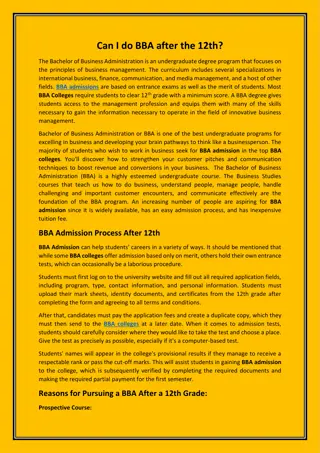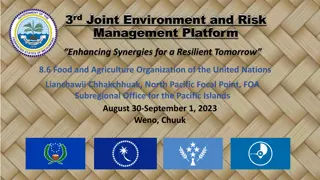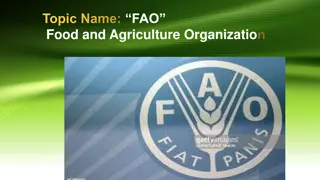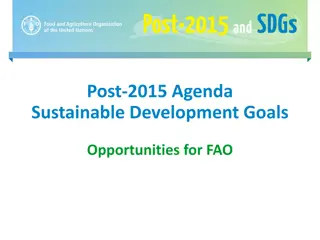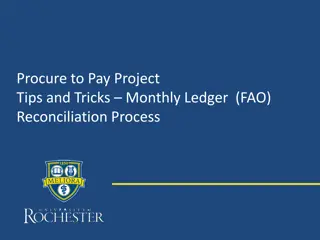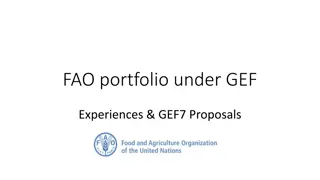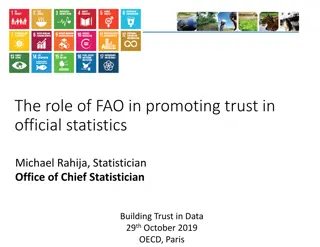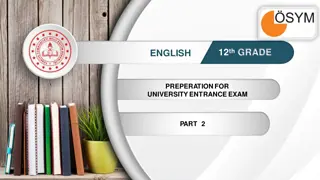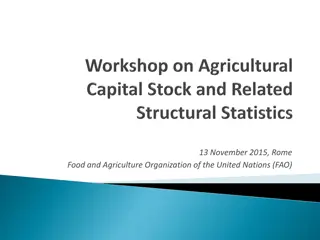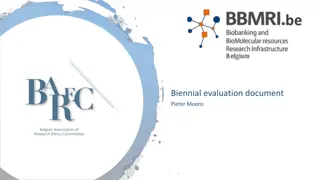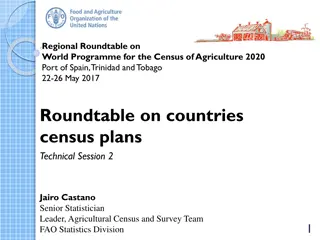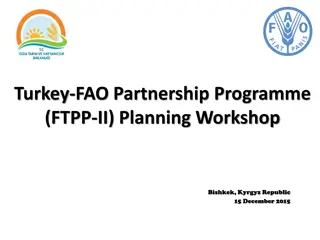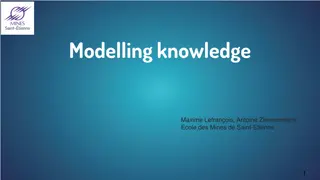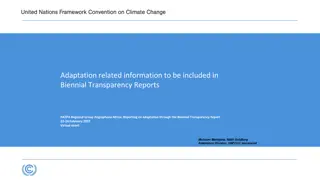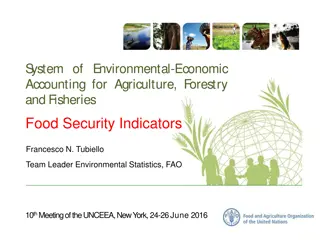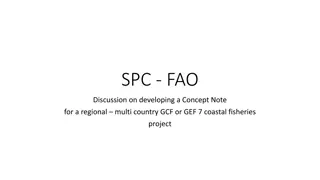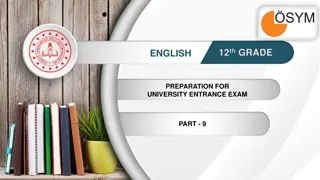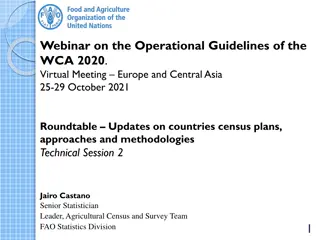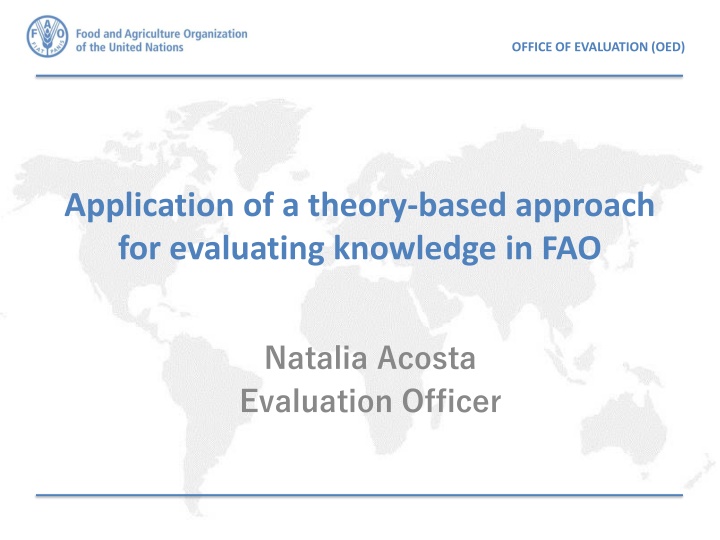
Theory-Based Approach for Evaluating Knowledge in FAO: Office of Evaluation
"Explore how the Office of Evaluation at FAO implements a theory-based approach to assess knowledge effectiveness and quality, focusing on tangible aspects. Learn about the methodology, evaluation questions, and the complex knowledge structure within FAO. Discover insights from the 12th EES Biennial Conference."
Download Presentation

Please find below an Image/Link to download the presentation.
The content on the website is provided AS IS for your information and personal use only. It may not be sold, licensed, or shared on other websites without obtaining consent from the author. If you encounter any issues during the download, it is possible that the publisher has removed the file from their server.
You are allowed to download the files provided on this website for personal or commercial use, subject to the condition that they are used lawfully. All files are the property of their respective owners.
The content on the website is provided AS IS for your information and personal use only. It may not be sold, licensed, or shared on other websites without obtaining consent from the author.
E N D
Presentation Transcript
OFFICE OF EVALUATION (OED) Application of a theory-based approach for evaluating knowledge in FAO Natalia Acosta Evaluation Officer
OFFICE OF EVALUATION (OED) Section 1 BACKGROUND ON THE EVALUATION 12th EES Biennial Conference 2016 3/19/2025 2
OFFICE OF EVALUATION (OED) FAO: A complex knowledge production and management structure Specialized UN agency Knowledge Organization: many units collecting, analyzing and producing information (core mandate) Technical departments: Fishery, Forestry, Nutrition, Plant Protection, Animal Health, Land and Water, Statistics, etc. Cross-cutting themes: Capacity Development, Gender, Governance Decentralized offices (+90) 12th EES Biennial Conference 2016 3/19/2025 3
OFFICE OF EVALUATION (OED) The Knowledge Evaluation Objective: assess effectiveness and quality (from users perspective) of knowledge Conducted: 2014 -2015 / Period covered: 2011-2014 Focused on the tangible aspect of knowledge and its use not so much on the production and dissemination process No framework to evaluate knowledge Carried out by a team of 13 experts and 4 OED staff 12th EES Biennial Conference 2016 3/19/2025 4
OFFICE OF EVALUATION (OED) Section 2 THE METHODOLOGY 12th EES Biennial Conference 2016 3/19/2025 5
OFFICE OF EVALUATION (OED) Designing the Methodology Scoping Phase Inception Phase Main Evaluation phase Desk research & informal external consultations to frame evaluation questions Initial discussions with FAO staff to identify/map type of knowledge and dimensions of complexity (Step 1. mapping complexity dimensions) 4 units of analysis / 4 components Development of generic Theory of Change for FAO knowledge products and services 12th EES Biennial Conference 2016 3/19/2025 6
OFFICE OF EVALUATION (OED) Evaluation Questions 1. Are FAO s products consistent with the Organization s goals, needs or mandates? Are FAO s products adequate? How well does FAO ensure the technical excellence and quality of its products? How efficiently has FAO used its human and financial resources in the production and dissemination of its products? Are there synergies, duplications or gaps in the products produced and disseminated by FAO? Have FAO s products reached the intended users and uses? What outcomes have FAO s products achieved, or contributed to achieving? 2. 3. 4. 5. 6. 7. 12th EES Biennial Conference 2016 3/19/2025 7
Inputs Processes Intermediate Outcome Outputs Audiences Immediate Outcome Knowledge products Audience needs and priorities identified Human Resources Policy & advocacy Donors Policy- makers Civil society Environment informed Evidence-based information contributes to policy and increased resources for food and agriculture Scale-up of proven approaches supported User Norms & Standards satisfaction Knowledge workers (FAO staff) Information collected, synthesized & organized Technical reports & policy briefs Content, presentation & delivery facilitate understanding, adoption & adaptation Technical experts Manuals & guidelines Programs & practice Managers Knowledge workers Technical experts Advisory committees Technical consensus developed Programs & practice enhanced Adoption of evidence- based practice Enhanced quality of policy/technical advice Improved quality of service delivery Training guides Audience members Good practices Information uptake and application strategies developed Institutional Resources Knowledge services Product or service Reach Training & education Trainers/ Educators Trainees Distance learning Literature Training & education enhanced Evidence-based information informs & updates training & educational programs Quality products & services perceived as relevant, credible, authoritative & trustworthy Dissemination strategies developed Training programs Information technology Databases Infrastructure Databases developed & populated Web sites & portals Research enhanced Speed of research to practice increased Financial resources Research Knowledge workers Researchers Tools & support for knowledge sharing (Networking, capitalization of experiences) Policies and procedures Networking approaches developed Eradication of hunger, food insecurity and malnutrition Elimination of poverty Long-term Outcomes
OFFICE OF EVALUATION (OED) Implementing the Methodology Inception Phase Main Evaluation phase Scoping Phase Component 1 Inventory & survey of knowledge products and services staff Component 2 Meta-evaluation (+50 reports) + 600 publications, 70 databases, 120 networks, 70 learning resources Type of products 1. Publications 2. Databases 3. Networks 4. Learning Resources Step 2. Units of analysis 12th EES Biennial Conference 2016 3/19/2025 9
OFFICE OF EVALUATION (OED) Implementing the Methodology Main Evaluation phase Inception Phase Scoping Phase Component 4 Component 3 Sectoral assessments (10 case studies) Survey FAO Member Countries and clients Tools Approach User surveys (online) Cybermetric studies (big data) Key informant interviews Contribution analysis based on reconstructed TOC Publications Databases Secondary data (meta- evaluation) Networks SWOT analysis Learning Resources 12th EES Biennial Conference 2016 3/19/2025 10
OECD-FAO Agricultural Outlook Outputs Processes Audiences Inputs Immediate Outcome Intermediate Outcome Consultations conducted to identify needs and priorities of OECD MC & Key Partners and FAO MS Topics submitted to Committee for final deliberation/approval Data from OECD MC collected through questionnaire and processed by FAO from FAOSTAT Consultations with industry groups organized Information reviewed, checked, organized Models updated and projections developed Technical reviews conducted (baseline projections and key findings) Outlook produced, reviewed and declassified (APM) Dissemination strategies developed and implemented (senior management launch, press release, website, conferences and events, etc.) Policy & advocacy Policy-makers International organisations Resource Partners Civil Society Human Resources Technical experts (FAO staff, OECD staff, etc.) Governance bodies and advisory committees (OECD & FAO Secretariats, OECD Group on Commodity Markets, Working Party on APM, FAO EST, ESS, ESA, FI, etc.) National government agencies International commodity associations (cotton, fish, dairy, sugar, etc. Private sector (consultancies, etc.) Audience members (OECD MC & FAO MS, MoA, etc.) Knowledge products OECD-FAO Agricultural Outlook Separate outlets, working papers, Highlights (2013) Database of latest national commodity market developments, including domestic agricultural support & trade policy regimes Database User Guide, manuals & guidelines (general description of the model, detailed model documentation, full set of equations and model parameters, results of tests carried out in the process of model validation) Technical reports Environment informed Informing policy debates and resource planning Informing debates on, and negotiations of, agricultural trade-related agreements National and international institutions used the Outlook to develop projections (in a cost- effective manner) User satisfaction Content, presentation & delivery facilitate understanding, adoption & adaptation Programmes & practice Technical experts Product or service Reach The Outlook and related products & services are perceived as relevant, credible & useful Programmes & practices enhanced Private sector Specialized commodity groups Analysts & technical experts Industry associations Institutional Resources Policies and procedures (OECD-FAO partnership agreement, country questionnaires, etc.) Models, databases, software and information technology (COSIMO, Aglink, TROLL, GAMS, etc.) Literature Infrastructure Financial resources Private sector informed Knowledge services Databases (EN, FR) Web sites & portals Tools & support for knowledge sharing (capacity development, visiting experts, networks) Education & research enhanced Academia & Research Education (methods) Researchers (outputs) Long-term Outcomes Eradication of hunger, food, insecurity and malnutrition Elimination of poverty Sustainable management of natural resources
OFFICE OF EVALUATION (OED) Cybermetric Analysis Estimated references and citations for SOFA and the World Development Report Reference estimates Academic citations Google scholar Publication Links Web sites 353 Scopus FAO State of Food and Agriculture 2010-11 Gender World Bank 2012 World Development Report Gender 786 4 20 938 427 19 134 12th EES Biennial Conference 2016 3/19/2025 12
OFFICE OF EVALUATION (OED) Web community of the FAO publication State of Food and Agriculture publication 12th EES Biennial Conference 2016 3/19/2025 13
OFFICE OF EVALUATION (OED) Data Analysis and Reporting Reassembling into a whole (2 levels) Sectoral assessments: Common checklist and matrix to synthesize information from case studies and identify common findings by evaluation question Final evaluation report: Attempt to draw generic findings that respond to key evaluation questions (relevance, use and efficiency of FAO s knowledge products and services) 12th EES Biennial Conference 2016 3/19/2025 14
OFFICE OF EVALUATION (OED) Section 3 CONCLUSIONS 12th EES Biennial Conference 2016 3/19/2025 15
OFFICE OF EVALUATION (OED) Benefits of the methodology Modular design useful to collect evaluative data from a complex programme in a step-by-step process Increased learning within FAO on the use of a TOC for programme management New tools such as cybermetric studies useful to validate and complement findings collected with traditional tools Required a collaborative and participatory process 12th EES Biennial Conference 2016 3/19/2025 16
OFFICE OF EVALUATION (OED) Challenges Difficulties in reassembling results and drawing general conclusions > used anecdotal evidence Difficulties in identifying relationships and synergies between the units of analysis Quantifying and analysing the breadth of qualitative data collected from different stakeholders (user surveys) 12th EES Biennial Conference 2016 3/19/2025 17
OFFICE OF EVALUATION (OED) Thank you Visit our website www.fao.org/evaluation/en/

